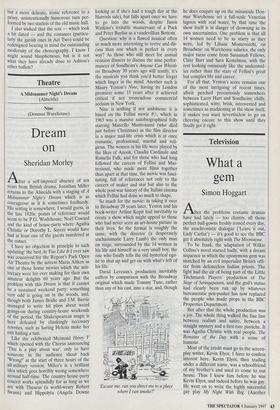Theatre
A Midsummer Night's Dream (Almeida)
Nine (Donmar Warehouse)
Dream on
Sheridan Morley
after a self-imposed absence of ten years from British drama, Jonathan Miller returns to the Almeida with a staging of A Midsummer Night's Dream which is as courageous as it is sometimes foolhardy. His setting is somewhere, I would guess, in the late 1920s: points of reference would seem to be P.G. Wodehouse, Noel Coward and the kind of house-party where Agatha Christie or Dorothy L. Sayers would have had at least one of the guests murdered at the outset.
I have no objection in principle to such updating: the best As You Like It I ever saw was conceived for the Regent's Park Open Air Theatre by the actress Maria Aitken as one of those home movies which the aris- tocracy were for ever making for their own amateur delights 60 years ago. But the problem with this Dream is that it cannot be a sustained weekend party: something very odd is going on in the woods, and, though both James Bridie and J.M. Barrie managed to write hit plays about weird goings-on during country-house weekends of the period, the Shakespearean magic is here defeated by clunkingly necessary rewrites, such as having Helena make her exit hailing a taxi. Like the celebrated Mermaid Henry V which opened with the Chorus announcing This is a play about war', only to have someone in the audience shout back Wrong!' at the start of three hours of the all-military version, Miller's is a brilliant idea which goes horribly wrong somewhere around half-time. The country house-party conceit works splendidly for as long as we are with Theseus (a world-weary Robert Swann) and Hippolyta (Angela Downe looking as if she's had a tough day at the Harrods sale), but falls apart once we have to go into the woods, despite Jason Watkins's irritable manservant of a Puck and Peter Bayliss as a vaudevillian Bottom.
Question: why is a flawed musical often so much more interesting to revive and dis- cuss than one which is perfect in every way? As those who still meet for annual reunion dinners to discuss the nine perfor- mances of Sondheim's Anyone Can Whistle on Broadway 30 years ago will testify, it's the musicals you think you'd better forget which linger in the mind. Another such is Maury Yeston's Nine, having its London premiere some 15 years after it achieved critical if not tremendous commercial acclaim in New York.
Nine is nothing if not ambitious: it is based on the Fellini movie 8'/2, which in 1963 was a massive autobiographical folly starring Marcello Mastroianni (who died just before Christmas) as the film director in a major mid-life crisis which is at once romantic, professional, marital and reli- gious. The women in his life were played by the likes of Anouk, Claudia Cardinale and Rossella Falk, and for those who had long followed the careers of Fellini and Mas- troianni, who made more films together than apart at that time, the movie was fasci- nating, full of references not only to the careers of maker and star but also to the whole post-war history of the Italian cinema which Fellini had done so much to shape.
So much for the movie: in taking it over to Broadway 20 years later, Yeston and his book-writer Arthur Kopit had inevitably to create a show which might appeal to those who had never seen an art-house picture in their lives. So the format is roughly the same, with the director (a desperately uncharismatic Larry Lamb) the only man on stage, surrounded by the 14 women in his life and himself as a very small boy, the one who finally tells the old hysterical ego- ist to shut up and get on with what's left of his life.
David Leveaux's production inevitably suffers by comparison with the Broadway original which made Tommy Tune, rather than any of his cast, into a star, and, though `Excuse me, can you direct me to a place where I can smoke?' he does conjure up on the minuscule Don- mar Warehouse set a full-scale Venetian lagoon with real water, by that time the show itself is in danger of drowning in its own uncertainties. One problem is that all 14 women need to be as starry as they were, led by Liliane Montevecchi, on Broadway: on Warehouse salaries, the only major turns come from Susannah Fellows, Clare Burt and Sara Kestelman, with the rest looking ominously like the understud- ies rather than the stars of Fellini's great but complex life and career.
For all that, Yeston's score remains one of the most intriguing of recent times, albeit perched precariously somewhere between Larry Hart and Sondheim; chilly, sophisticated, witty, brisk, introverted and sometimes as maddening as the show itself, it makes you want nevertheless to go on cheering encore to this show until they finally get it right.


























































 Previous page
Previous page